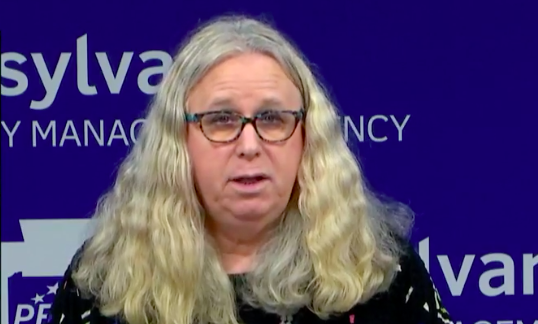This trans doctor is leading the fight back against coronavirus and saving lives

Dr Rachel Levine giving a live update on the coronavirus crisis in Pennsylvania (Facebook/Pennsylvania Department of Health)
A transgender doctor has become the public face of Pennsylvania’s response to the coronavirus crisis, and she’s doing brilliantly.
A graduate of Harvard College and a specialist in paediatrics and adolescent medicine, Dr Rachel Levine is a trusted national speaker who’s advised on issues ranging from the opioid crisis to LGBT+ health.
As secretary of health for Pennsylvania, she’s now working seven days a week to lead her state through the pandemic.
Levine joins governor Tom Wolf for televised daily briefings where she provides Pennsylvanians with updates, advice, and most importantly, reassurance. Her key message is a simple one: “Stay home, stay calm, and stay safe.”
“We’re going to do whatever is possible, whatever it takes, to protect the public health of Pennsylvania,” she told The Advocate.
“It doesn’t make any difference what my gender identity is. All that matters is my professional work,” she continued.
“I want to be judged upon my work in medicine and in public health and in this difficult time, in my work to help to protect the public health in the face of this global pandemic.
“It doesn’t make any difference what someone’s gender identity or sexual orientation is. We’re really all in this together.”
All Pennsylvanians have an important role to play in stopping the spread of #COVID19 and saving lives.
Your job right now is to stay calm, stay home and stay safe.#FlattenTheCurve pic.twitter.com/JkAsvKHu2h
— Dr. Rachel Levine (@SecretaryLevine) March 16, 2020
In the early stages of the virus, Dr Rachel Levine acted swiftly by closing public schools and rolling out stay-at-home orders in Pennsylvania.
Going forward, her pandemic plan has three stages – mitigate the spread, expand testing, and prepare the healthcare system for what’s to come.
“Through the mitigation efforts, we’re hoping to take off the peak of that surge so that our hospitals and health systems can manage it,” she said.
“We’ll know we’re coming out the other side when we start to see a decrease in the number of new cases – a sustained decrease in the number of new cases. And then we’ll be reassessing all of our strategies. But we’re not there yet.”
With many LGBT+ people being more vulnerable to the virus and also more likely to experience barriers to healthcare, she hopes her own visibility will help them feel “as comfortable as possible” accessing the care they need.
She’s also providing an important counterpoint to the common demonisation of transgender people in society.
“I hope by my being there every day in the trenches with the work that I’m doing, that hopefully demonstrates to the public that members of the LGBTQ community are really just here to work for the public health and for the common good,” she said.
“And hopefully, that means something.”

